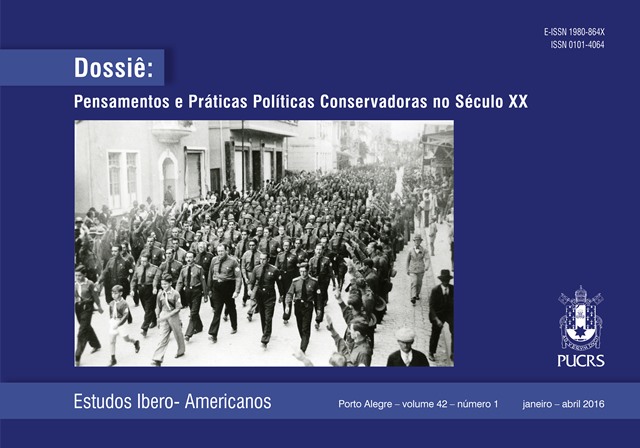The Hungarian Revolution of 1956 and the anticommunist argumentation in the public discussion during the formation of Independent Foreign Policy in Brazil
DOI:
https://doi.org/10.15448/1980-864X.2016.1.21831Keywords:
Brazil, Hungary, Hungarian Revolution of 1956, Anti-communist PropagandaAbstract
In the late 1950s and early 1960s, standpoints changed in Brazilian foreign policy, as it became adapted to the transformation of the international situation. A public debate began in which two poles were formed: one of the them promoted the economical opening on the basis of pragmatic considerations for Central and Eastern European countries, and the other camp – especially the side committed with anticommunist and anti-Soviet ideals – rejected the Brazilian approach to the Soviet Union. In their argumentation, Hungary and the Hungarian Revolution of 1956 appeared as an example, as a heroic resistance against the communist regime. We present our study in Brazilian anti-Soviet rhetoric through the analysis of printed sources (books, pamphlets), which show the Hungarian Revolution becoming a heroic, symbolic event. This was particularly suitable for the anti-communist propaganda at the time, where the Hungarians appeared as an enslaved nation and the Revolution of 1956 becomes the symbol of resistance against Communism.
Downloads
References
ALENCASTRE, Amilcar. O Brasil e as relações com o Leste e a U.R.S.S. Rio de Janeiro: Nap, 1959.
______. Osvaldo Aranha; o mundo afro-asiático e a paz. Rio de Janeiro: Nap, 1961.
ARANHA, Oswaldo. Relações diplomáticas com a União Soviética. Revista Brasileira de Política Internacional, Rio de Janeiro, v. 1, n. 2, p. 18-28, 1958.
ARQUIVO pessoal de Oswaldo Aranha – FGV/CPDOC, o catálogo disponível em: . Acesso em: 28. mar. 2015.
BELOCH, Israel; ALVES DE ABREU, Alzira (Coord.). Dicionário histórico biográfico brasileiro 1930-1983. Rio de Janeiro: Forense-Universitária – Finep, 1984.
BOTO, Carlos Pena. A desastrada política exterior do Presidente Jânio Quadros. Petrópolis: Vozes, 1961a.
______. Como se desenvolve a Ofensiva Comunista. Petrópolis: Vozes, 1961b.
______. O que é o comunismo! Petrópolis: Vozes, 1961c.
CORRÊA, Manoel Pio. O mundo em que vivi. 3. ed. Rio de Janeiro: Expressão e Cultura, 1996.
HILTON, Stanley. Oswaldo Aranha: uma biografia. Rio de Janeiro: Objetiva, 1994.
LAMARÃO, Sérgio. Verbete “Boto, Pena”. Arquivos digitais do Centro de Pesquisa e Documentação de História Contemporânea do Brasil (Cpdoc) da Fundação Getúlio Vargas, Rio de Janeiro. Disponível em: . Acesso em: 28 mar. 2015.
MOREIRA, Regina da Luz. Verbete “Aranha, Osvaldo”. Arquivos digitais do Centro de Pesquisa e Documentação de História Contemporânea do Brasil (Cpdoc) da Fundação Getúlio Vargas, Rio de Janeiro. Disponível em: . Acesso em: 28 mar. 2015.
MOTTA, Rodrigo Patto Sá. Em guarda contra o perigo vermelho: o anticomunismo no Brasil (1917-1964). São Paulo: Perspectiva, Fapesp, 2002.
______. João Goulart e a mobilização anticomunista de 1961-64. In: FERREIRA, Marieta de Moraes (Coord.). João Goulart entre a memória e a história. Rio de Janeiro: Editora FGV, 2006. p. 129-147.
MOURA, Gerson. Sucessos e ilusões – Relações internacionais do Brasil durante e após a Segunda Guerra Mundial. Rio de Janeiro: Editora da Fundação Getúlio Vargas, 1991.
ÓNODY, Oliver. Relações comerciais do Brasil com o Bloco Soviético. Revista Brasileira de Política Internacional, Rio de Janeiro, v. 11. p. 38 75, 1960.
PESSOA, Lenildo Tabosa. A revolução popular – operários, estudantes e intelectuais contra o imperialismo. Caruaru: Livraria e Tipografia Estudantil, 1966.
PONGRÁCZ, Attila. A vida e a obra do economista e historiador húngaro Olivér Ónody. Acta Scientiarum Socialium (Historia, Oeconomia, Paedagogia, Philosophia, Sociologia), Kaposvár (Hungria), t. XXIII, p. 63-73, 2006.
SAN TIAGO DANTAS, Francisco Clementino de. Política externa independente. Rio de Janeiro: Civilização Brasileira, 1962.
SPIRY, Zsuzsanna Filomena. Paulo Rónai, um brasileiro made in Hungary. MA diss., Universidade de São Paulo, 2009.
STORRS, Keith Larry. Brazil’s Independent Foreign Policy, 1961-1964. Ithaca: Cornell University, 1973.
SZABO, Ladislao; SEGRILLO, Angelo; AQUINO, Maria Aparecida de; AUBERT, Pedro Gustavo. Hungria 1956 ... e o muro começa a cair. São Paulo: Contexto, 2006.
SZILÁGYI Ágnes Judit. Az “O Estado de Sao Paulo” című újság kommentárjai a magyar ‘56 forradalmi napjaiban. Acta Hispanica - Acta Universitatis Szegediensis de Attila József Nominatae, Szeged (Hungria), t. 12, p. 143-159, 2007.
SZILÁGYI Ágnes Judit; SÁRINGER János. Ifj. Horthy Miklós, a Kormányzó kisebbik fia. Budapest: Holnap Kiadó, 2002.
VIZENTINI, Paulo Fagundes. Relações exteriores do Brasil (1945-1964) – O nacionalismo e a política externa independente. Petrópolis: Vozes, 2004.
______. Relações internacionais do Brasil: de Vargas a Lula. São Paulo: Editora Fundação Perseus Abramo, 2003.
Downloads
Published
How to Cite
Issue
Section
License
Copyright
The submission of originals to Estudos Ibero-Americanos implies the transfer by the authors of the right for publication. Authors retain copyright and grant the journal right of first publication. If the authors wish to include the same data into another publication, they must cite Estudos Ibero-Americanos as the site of original publication.
Creative Commons License
Except where otherwise specified, material published in this journal is licensed under a Creative Commons Attribution 4.0 International license, which allows unrestricted use, distribution and reproduction in any medium, provided the original publication is correctly cited.






